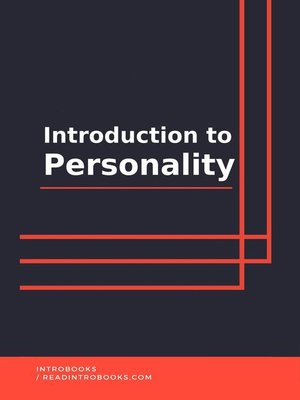
Sign up to save your library
With an OverDrive account, you can save your favorite libraries for at-a-glance information about availability. Find out more about OverDrive accounts.
Find this title in Libby, the library reading app by OverDrive.



Search for a digital library with this title
Title found at these libraries:
| Library Name | Distance |
|---|---|
| Loading... |
The term Personality has been derived from the Latin word ' persona', which is a mask that is used by the actors in the Roman theatre for changing their facial make-up to depict different notions of personality. In the layman language, Personality refers to the physical or external appearance of the individual. For instance, a good-looking person is often regarded to have a charming personality however, it is not necessary for it to be a 100% true as it is simply an assumption of personality that is based on the superficial impressions of an individual. In the psychological terms, the American Psychological Association defines Personality as 'characteristic ways of responding to individuals and situations.'The study of the psychology of personality is known as Personality Psychology, which carries out the study of different tendencies that bring about the differences in the display of the behavior. Personality psychology comprises of the extravagant theories given by famous psychologists like Sigmund Freud, Abraham Maslow, Carl Rogers, Gordon Allport, Alfred Adler and Hans Eysenck which are used for assessing personality and behavior of an individual.There are two main tools which have been designed for measuring personality- Projective tests and Objective Measures.Some examples of tests are- The Minnesota Multiphasic Personality Inventory, Eysenck Personality Questionnaire, 16 Personality Factor Questionnaire, The Rorschach Ink Blot Test, The Thematic Apperception Test, Sentence Completion Test, Draw-a-person Test, Rosenzweig's Picture-Frustration Study, Interview, Observation, Behavioral Ratings, Nomination, Situational Tests.







